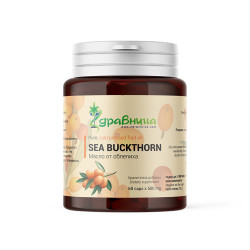Beta carotene is a red-orange pigment found in plants and fruits, especially carrots and cauliflower.
The name beta carotene comes from the Greek "beta" and the Latin "carote" (carrot). Beta carotene was discovered as far back as 1831 by H. Wackenroder, who isolated it from carrots and yellow turnips. The name carotenoids was introduced in 1911 by the Russian biologist Mikhail Tsvet, the discoverer of one of the most valuable methods of chemical analysis - chromatographic. With its help Tsvet manages to separate a number of plant pigments, which marks the beginning of their study and application.
Coincidentally, the first carotenoid discovered - beta-carotene, proved to be one of the most important for the human body.
Beta-carotene is also known as provitamin A, because in the human body it is transformed into fat-soluble vitamin A (retinol), which is involved in a huge number of vital processes - regulation of protein synthesis, immune protection, new cell growth, bone formation and teeth, etc.
The conversion of beta carotene to vitamin A takes place in the liver and small intestine under the action of the iron-containing enzyme beta-carotene dioxygenase. Curiously, this process takes place only when necessary - when the body's vitamin A content drops below a certain critical level.
Health benefits of beta carotene
Beta carotene has a number of benefits for our health, including:
Antioxidant
Beta carotene, like all carotenoids, is an antioxidant. An antioxidant is a substance that inhibits the oxidation of other molecules; protects the body from free radicals.
Cognitive decline
Regular and long-term intake of foods or supplements containing beta carotene significantly reduces the risk of cognitive decline. Oxidative stress is thought to be a key factor in cognitive decline, experts say. Studies show that antioxidant supplements can help prevent memory and brain function.
As already mentioned, beta carotene has a number of useful properties. Below we will list some key things about beta carotene that we all need to know:
- Beta carotene is a red-orange pigment found in many fresh fruits and vegetables;
- Beta carotene is converted into vitamin A;
- Beta carotene is a carotenoid and antioxidant;
- As an antioxidant, beta carotene is extremely beneficial for the health of the whole body, especially the liver;
- Beta carotene can help older people maintain the strength of their lungs with age.
Which foods are rich in beta carotene?
Among the main, natural sources of beta carotene are:
- Carrots;
- Asparagus;
- Broccoli
- Dandelion leaves;
- Herbs and spices such as hot red pepper, oregano and parsley;
- Peas;
- Plums;
- Pumpkin;
- Spinach.
Carrot and milk thistle oil for a healthy liver
Carrot and milk thistle oil of "Zdravnitza" is a synergistic formula with an all-natural composition according to the author's recipe. Regular intake of the oil will contribute to the normal condition and functioning of the liver and bile.
Carrot and milk thistle oil contains carrot oil extract in cold pressed milk thistle oil. It does not contain additives or harmful substances.
Among the many beneficial properties of this oil is its beneficial effect in liver diseases - cirrhosis, hepatitis; hepatic fatty degeneration; fatty liver disease caused by diabetes; cholelithiasis.





